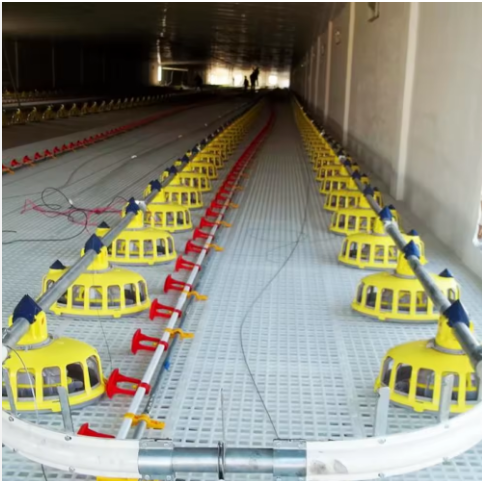News
In summer, high temperature and high humidity, chickens are often under heat stress, and the feed intake drops significantly, resulting in insufficient intake of various nutrients, affecting the health and production performance of laying hens. Under such conditions, rational adjustment of feed nutrient levels and feeding methods is also an effective means to improve the performance of summer chickens. So what should be done specifically, Poultry Farming Equipment Manufacturer will come to tell you.
Poultry Feeder Pan
1, energy should be increased
The use of a sufficient amount of Poultry Feeder Pan to add fat to the feed can change the palatability of the feed, prolong the residence time of the feed in the digestive tract, and improve the feed intake and digestion of the laying hen. The amount of fat added to the feed during heat stress is preferably 2-3%, and the corresponding amount of corn is reduced by 4-6%, but the fat is easily oxidized and deteriorated, so antioxidants should be added to the diet while adding fat.
2, protein raw materials can not be too high
In the heat stress, the traditional way is to improve the protein intake of the laying hen by increasing the content of crude protein in the feed, but the protein metabolism produces much higher calories than carbohydrates and fat, which increases the metabolic heat production in the body. Accumulation, so the content of protein raw materials should not be increased when adjusting the feed formula, but should be appropriately reduced. Therefore, it is recommended to reduce the amount of raw materials such as miscellaneous protein and other raw materials in the diet, appropriately reduce the amount of animal protein feed such as fish meal, increase the raw materials with high protein content and high utilization rate such as soybean meal, but should not increase the total protein raw material dosage.
In order to improve the utilization of protein and ensure its nutritional needs, it is necessary to add essential amino acids according to the situation of dietary amino acids. Studies have found that methionine and lysine can alleviate heat stress. They are two basic amino acids that must be added. Add 10-15% to the diet, so that they can add 360mg of methionine and 720mg of lysine per chicken per day, and pay attention to maintaining the balance of amino acids.
3. Mineral adjustment
Heat stress can affect the quality of the eggshell (the eggshell becomes thinner and brittle), so the proportion of calcium and phosphorus in the summer diet should be adjusted according to the extent of the decrease in feed intake. In addition, the amount of mineral excretion in the excreta will increase under heat stress conditions. Heat stress affects the absorption of Mn, S, Se, Co, Mg plasma, and the demand for them increases, so the content in the feed should be increased accordingly according to the reduction of dietary intake.
4, vitamin adjustment
Heat stress has a great influence on the absorption of vitamin E, vitamin C and B vitamins, and the amount added in summer should be adjusted to 2-3 times of the normal amount. VC has an important relationship with the formation of eggshells, and should add at least 200 g / ton, which has no effect.
5, adjust the electrolyte balance
Generally, the potassium chloride is added at a concentration of 0.15-0.30%. At the same time, adding 0.3-0.5% baking soda to the feed can reduce the defective egg 1-2%, increase the egg production rate by 2-3%, increase the thickness of the eggshell, and improve the utilization of protein in the diet, but reduce it appropriately. The amount of salt used.
6, add heat, anti-stress drugs
Adding medicines that can improve the body's immunity, reduce the body's overdraft, increase the egg production rate, prolong the egg production peak, reduce the egg-to-egg ratio, increase the egg weight, and improve the egg quality. At the same time, don't forget to feed the hydrolysis heat, use the Automatic Nipple Drinker to ensure the daily moisture of the laying hen.
The above is the specific content of how to adjust the diet of laying hens in summer. In short, the heat stress caused by high temperature environment in summer is extremely significant. Long-term heat stress can cause the body's immunity to decline, induce disease, and seriously affect The production performance and benefits of laying hens, I hope this article will help everyone.

Pulished on Mar. 31, 2025